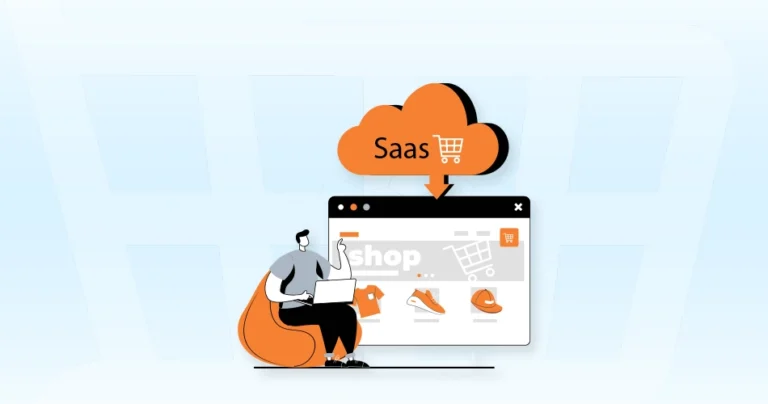Often, creating an eCommerce website entails some technical complexities, which may throw off some people. But SaaS (Software as a Service) eCommerce platforms offer a powerful and user-friendly solution. These cloud-based platforms provide everything you need to create a beautiful and functional online store, without extensive coding.
SaaS platforms handle the server maintenance, security updates, and ongoing technical upkeep. So you can focus on what truly matters: curating your products, building your brand, and reaching your target audience.
In this blog, we’ll tell you about the SaaS eCommerce platforms and when the eCommerce experts recommend them. Let’s begin.
What are SaaS eCommerce Platforms?
SaaS or Software-as-a-Service eCommerce platforms, are essentially online storefronts built on cloud-based software. So you don’t need to worry about installing or maintaining any complex software yourself.
Instead, the platform provider handles everything on their end. You can access and manage your store from any device with an internet connection.
These platforms offer a comprehensive suite of features designed to streamline every aspect of running an online business. From adding products and managing inventory to processing payments and fulfilling orders, SaaS eCommerce platforms provide user-friendly tools to keep things running smoothly.
Many even offer built-in marketing features like email marketing and eCommerce SEO functionality to help you attract new customers.
Why Use SaaS eCommerce Platforms?
SaaS eCommerce platforms can be excellent for those looking to create eStore in a user-friendly manner. Here are a few benefits SaaS platforms offer for eCommerce development.
- Cost-effectiveness: SaaS platforms eliminate the upfront costs associated with traditional eCommerce software licenses and server installations. You typically pay a monthly subscription fee, making it a scalable solution for businesses of all sizes.
- Ease of Use: SaaS platforms are designed with user-friendly interfaces, often featuring drag-and-drop functionality. This allows businesses to set up their online store quickly and easily, even without extensive technical knowledge.
- Automatic Updates and Maintenance: SaaS providers handle all software updates, security patches, and server maintenance. This frees up your business’s resources to focus on other areas like marketing and product development.
- Scalability: SaaS platforms are inherently scalable. They can easily accommodate growth in your business and traffic to your online store. You typically won’t need to worry about infrastructure limitations.
- Accessibility: SaaS platforms are cloud-based, which means you can manage your online store from anywhere with an internet connection. This allows for greater flexibility and remote work opportunities.
- Security: SaaS providers prioritize data security for their customers. They invest heavily in robust security measures to protect your customer information and ensure the uptime and performance of your online store.
- Integration Capabilities: Many SaaS platforms offer a wide range of integrations with third-party applications for marketing, analytics, shipping, and payment processing. This allows you to create a customized and efficient eCommerce ecosystem.
- Built-in Features: SaaS platforms often come equipped with a variety of built-in features such as product management tools, shopping cart functionality, SEO optimization tools, and marketing automation capabilities. This eliminates the need for additional software or plugins, reducing complexity.
- Faster Time-to-market: With their ease of use and pre-built features, SaaS platforms allow businesses to launch their online stores much faster. That is compared to traditional options that require extensive development work.
Overall, SaaS eCommerce platforms are user-friendly, cost-effective, and scalable for businesses of all sizes. These platforms can help establish a robust online presence and start selling quickly and securely.
Top SaaS eCommerce Platforms
Let’s take a look at the top SaaS eCommerce platforms and their features. So you can select the suitable one for creating the best eStores.
Shopify
Shopify is a leading SaaS eCommerce solution for businesses of all sizes. It boasts a user-friendly interface, extensive app store, and a robust set of features. That helps streamline everything from product listing and inventory management to marketing and sales.
This platform boasts a user-friendly drag-and-drop interface that doesn’t require any coding knowledge. You can easily customize your store’s design using pre-built themes and tailor the layout to match your brand identity.
Key Features
- Drag-and-drop store builder
- Extensive app store with a wide range of integrations
- Built-in marketing and SEO tools
- Multiple sales channels including social media and pop-up shops
- Abandoned cart recovery
With its user-friendly interface, scalability, and extensive app store, Shopify can be an excellent tool to turn your eCommerce vision into reality.
BigCommerce
BigCommerce is one of the top SaaS eCommerce platforms designed to empower medium to large-sized businesses with ambitious growth plans. Unlike some platforms that struggle to handle high volumes, BigCommerce is built for scalability, ensuring a smooth operation as your business expands and product catalogs grow.
Beyond B2C, BigCommerce offers functionalities like customer accounts with custom pricing and configurable order forms, ideal for B2B businesses.
Key Features
- Scalable architecture to accommodate business growth
- Built-in SEO features
- B2B functionalities
- Powerful product filtering and search options
- Unlimited product listings
While BigCommerce offers customization options, it may require technical expertise compared to a platform like Shopify with its drag-and-drop simplicity.
Squarespace
Squarespace is another intuitive drag-and-drop SaaS eCommerce platform. It allows you to design a beautiful online store without any coding knowledge. Squarespace boasts a collection of modern, mobile-responsive templates that ensure your store looks great on any device.
While not as feature-rich as some competitors, Squarespace offers all the essentials for getting started online. You can manage your inventory, add product descriptions and high-quality images, and even set up customer accounts. Built-in marketing tools, including email marketing campaigns, help you promote your store and connect with customers.
Key Features
- Easy-to-use website builder with beautiful templates
- Integrated marketing tools including email marketing
- Inventory management
- Mobile-responsive designs
- Customer account management
If you prioritize ease of use and a polished storefront design over extensive features and ultimate scalability, Squarespace could be a great fit.
Adobe Commerce
Adobe Commerce, formerly known as Magento, is an enterprise-level eCommerce platform. It caters to the specific needs of large businesses with complex sales structures and high-volume traffic. Unlike user-friendly platforms designed for beginners, Adobe Commerce offers unparalleled customizability.
Its open-source architecture allows developers to tailor the platform to meet almost any business need imaginable. That means a highly unique and fully-functional online store experience that reflects your specific brand identity and caters to your exact sales goals.
Key Features
- Highly customizable platform
- Open-source architecture for extensive customization
- Powerful marketing, merchandising, and analytics tools
- B2B functionalities
- Scalable architecture for large businesses
However, Adobe Commerce doesn’t offer the same level of out-of-the-box functionality as some of its competitors. Many features and integrations require custom development, adding to the overall cost and complexity.
Volusion
Volusion is a user-friendly, all-in-one SaaS eCommerce platform. It offers a comprehensive suite of features designed to streamline your online selling journey, from managing products and inventory to marketing your store and fulfilling orders.
Beyond the basics, Volusion equips you with marketing tools like email marketing campaigns to promote your store. You also get built-in CRM (Customer Relationship Management) functionalities to manage customer interactions.
Key Features
- Shopping cart abandonment recovery
- Built-in CRM (Customer Relationship Management) tools
- Integrated marketing tools including email marketing
- Inventory management with purchase orders and low-stock alerts
- Scalable plans to accommodate growth
However, be mindful of the potential transaction fees associated with higher sales volume.
Salesforce Commerce Cloud
Salesforce Commerce Cloud is an enterprise-grade SaaS eCommerce platform. It offers a comprehensive suite of features designed to deliver an omnichannel commerce experience, connecting with customers across various touchpoints. That includes websites, social media platforms, mobile apps, and even physical stores.
One of Salesforce Commerce Cloud’s key strengths is its customizability. Leveraging AI, the platform can personalize product recommendations and marketing messages for each customer, creating a more engaging shopping experience.
Key Features
- Omnichannel commerce to connect with customers across various touchpoints
- AI-powered features for personalization and recommendations
- Headless commerce architecture for greater flexibility and customization
- B2B functionalities
- Extensive integrations with Salesforce CRM and other cloud-based applications
However, Salesforce Commerce Cloud requires more technical expertise to set up, manage, and maintain.
There are several other SaaS eCommerce platforms available. But for the most suitable option, you can consult with our eCommerce consulting services.
How to Choose a SaaS eCommerce Platform?
Choosing the right SaaS eCommerce platform can feel overwhelming with so many options available. But here are a few factors that play a significant role:
- Business Size & Stage: Are you a solopreneur or a large enterprise? Just starting out or experiencing rapid growth?
- Product Catalog Size & Complexity: How many products do you sell? Do they have variations or require special features?
- Sales Model: B2C (Business-to-Consumer) or B2B (Business-to-Business)? Do you need functionalities like tiered pricing or complex order forms?
- Comfort Level: How comfortable are you with technology? Do you have an in-house development team?
- Ease of Use: Prioritize user-friendly platforms with drag-and-drop interfaces if you’re new to eCommerce.
- Pricing Structure: Subscription fees, transaction fees, or a combination? Consider your budget and projected sales volume.
- Growth Potential: Choose a platform that scales with your business. Will it accommodate a growing product catalog and increasing sales?
- Essential Features: Inventory management, product listings, payment processing, marketing tools, etc.
- Advanced Needs: Do you need features like abandoned cart recovery, omnichannel selling, or B2B functionalities?
- Seamless Integration: Does the platform integrate with your existing tools (e.g., email marketing, accounting software, shipping solutions)?
Most platforms offer free trials. Utilize them to test the platform’s interface and features. You can also consult with our eCommerce website development company to create the best Store.
Conclusion
A SaaS eCommerce platform is a cloud-based software solution that enables businesses to create and manage online stores without needing to install or maintain any software. These platforms provide a range of features including website building tools, inventory management, payment processing, and marketing capabilities.
6 of the best SaaS eCommerce platforms include:
- Shopify
- BigCommerce
- Squarespace
- Adobe Commerce
- Volusion
- Sales Commerce Cloud
If you need help with creating the best eStore with any or these platforms, consult with our experts today!
FAQs on Top SaaS eCommerce Platforms
Q1. What is the difference between SaaS and on-premise eCommerce platforms?
SaaS (Software as a Service) platforms are cloud-based, meaning the software is hosted by the provider and accessed through a web browser. On-premise platforms require you to install and maintain the software on your own server, which can be expensive and technically complex.
Q2. What are the benefits of using a SaaS eCommerce platform?
SaaS platforms offer several advantages, including:
- Cost-effective: Compared to traditional, self-hosted solutions, SaaS is generally more affordable.
- Faster Launch Time: User-friendly interfaces and drag-and-drop functionalities allow you to set up your store quickly.
- Reduced Technical Burden: The platform provider handles server management and software updates.
- Scalability: Most platforms offer plans that scale with your business growth.
- Security and Compliance: SaaS providers prioritize data security and ensure their platforms comply with industry regulations.
Q3. What are the key features to look for in a SaaS eCommerce platform?
Key features to look for include:
- Customizable template
- Intuitive website builders
- Mobile responsivene
- Secure payment processing
- Inventory management
- Order fulfillment tools
- SEO capabilities
- Analytics and reporting
- Marketing features such as email marketing and social media integration.

